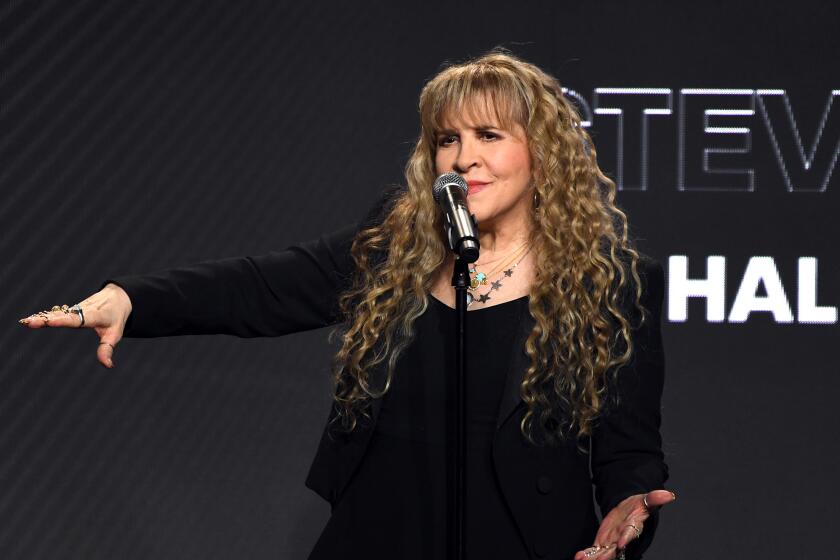Digging into Elton John’s expanded Record Store Day release ‘17-11-70’
- Share via
Elton John may be one of the most committed superstar music consumers. John habitually engaged in music store shopping sprees in various cities on his world tours in years past, amassing a monumental collection over the decades. He largely sold it off in the early 1990s to raise money for his Elton John AIDS Foundation.
As he only half-jokingly told an audience last year at a free show he gave in the parking lot of the former Tower Records store in West Hollywood, “I could have probably bought Los Angeles for the money I spent in Tower Records.”
See the most-read stories in Entertainment this hour »
But he couldn’t give up the passion entirely.
“I’ve fallen in love again with the ritual, of sleeve notes — especially on old albums —and I’ve been re-collecting a lot of old blues records,” he told The Times in an interview last year. “I’ve fallen in love with the ritual of finding out who these people were, who played with them, sitting down and listening to the records”
So it’s no surprise he’s returning the favor, in a manner of speaking, with a special of an expanded reissue — on vinyl only — of his 1970 live album, “17-11-70,” to be released at independent music outlets on April 22. It marks the 10th anniversary of Record Store Day, an event designed to spur shopping at mom-and-pop brick-and-mortar record stores.
Outlets participating in the promotion include Amoeba Music in Hollywood, Fingerprints in Long Beach and many more.
John’s release is now a two-disc album that includes several additional takes not found on the original single-disc version that MCA Records issued a few months after the original concert,
John’s star was rapidly rising at the time he entered New York’s famed A&R Studio for radio station WABC-FM broadcast on Nov. 17, 1970, with bassist Dee Murray and Nigel Olsson. They had backed him on a string of dates that launched a career that soon made him the most successful recording artist of the 1970s — and No. 5 of all time — according to Joel Whitburn’s “Top Pop Singles” book collating Billboard’s charts across the decades.
A string of shows at the Troubadour in West Hollywood the previous summer had ignited the fuse on that career, and John soon became one of the hottest concert attractions in the world. The November performance for WABC-FM was intended strictly for the small audience on hand and the station’s listeners. But it was quickly bootlegged, prompting John’s label, MCA, to hustle out an official version the following May.
The new edition brings a remastered version of the original recording to new life and captures him at a critical juncture in his nascent career.
His debut U.S. album, “Elton John,” was chock full of exquisitely arranged and intimately performed songs about love in its early stages (the breakthough hit single “Your Song”), the miracle of birth (“The Greatest Discovery”), alienation and disillusionment (“Border Song”) and even a God-knows-what-it-means rocker (“Take Me to the Pilot”).
Many featured lush orchestrations by Paul Buckmaster. The revelation of “17-11-70” (which was issued in the U.S. with Americanized date nomenclature as “11-17-70”) was what an electrifying live performer John was.
Rock at that time was both intensely serious business and often temperamentally restrained, thanks to the rise of the sensitive singer-songwriter likes of James Taylor, Carole King and Cat Stevens.
John, however, channeled the early rock ’n’ roll spirit of such flamboyant pianistic predecessors as Jerry Lee Lewis and Little Richard, and it ignites in his live renditions of “Take Me to the Pilot,” “Bad Side of the Moon” and a playful arrangement of the Rolling Stones then-recent hit “Honky Tonk Women.”
The original album’s closer and piece de resistance was his 18-minute-plus barn-burner performance of “Burn Down the Mission,” a song that incorporated bits of Elvis Presley’s “My Baby Left Me” and the Beatles “Get Back,” and which would appear in comparatively abbreviated 6½-minute form on his next studio album, “Tumbleweed Connection.”
The second disc extends the stripped-down approach with a previously unreleased version of “Indian Sunset,” the historically minded tragic grand opus that would turn up on 1971’s “Madman Across the Water” album, and another “Tumbleweed Connection” song, “Amoreena.”
It also includes alternate versions of “Your Song,” “Country Comfort,” “I Need You To Turn To,” “Border Song” and “My Father’s Gun,” collectively reinforcing the inherent strength of the songs John wrote with lyricist Bernie Taupin, apart from the gorgeous arrangements they meticulously crafted for the studio versions.
Follow @RandyLewis2 on Twitter.com
For Classic Rock coverage, join us on Facebook
More to Read
The biggest entertainment stories
Get our big stories about Hollywood, film, television, music, arts, culture and more right in your inbox as soon as they publish.
You may occasionally receive promotional content from the Los Angeles Times.










